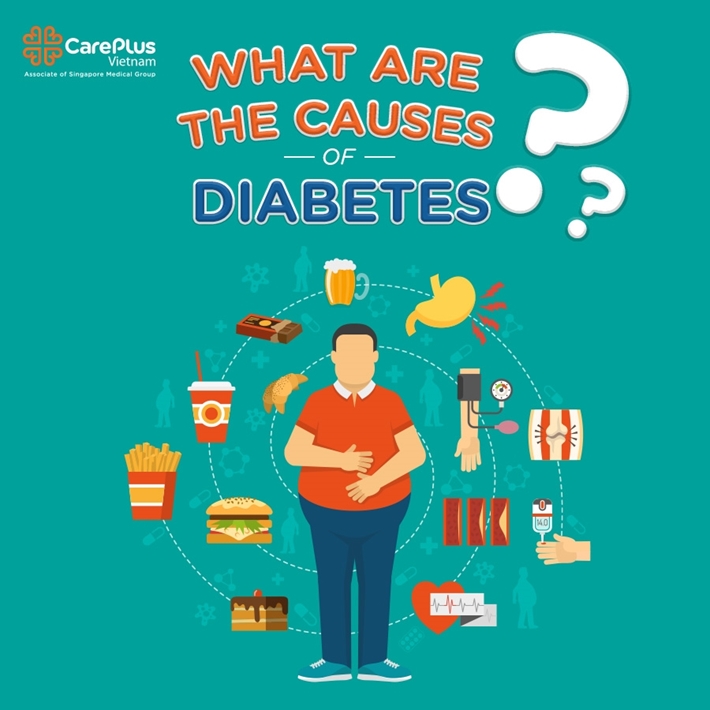Diabetes Overview: Symptoms & Causes
According to statistics of the World Diabetes Association (IDF), in 2019 worldwide, there were 463 million people (aged 20-79) with diabetes, expected to reach 578 million people in 2030 and 700 million people by 2045. In Vietnam alone, the proportion of patients with diabetes is increasing rapidly. The number of patients has doubled within ten years. It is predicted that by 2045, this number will increase to 7.7% of the total population.

9/23/2022 10:04:20 AM
What is diabetes?
Diabetes is a heterogeneous metabolic disorder characterized by hyperglycemia due to defects in insulin secretion, insulin action, or both. Chronic elevation of glucose for a long time causes disturbances in carbohydrate, protein, and lipid metabolism, causing damage to many different organs, especially in the heart and blood vessels, kidneys, eyes, and nerves.
Types of diabetes include:
-
Type 1 diabetes (due to destruction of pancreatic beta cells, leading to absolute insulin deficiency)
-
Type 2 diabetes (due to impaired pancreatic beta cell function progressing against the background of insulin resistance)
-
Gestational diabetes (diabetes diagnosed in the second or third trimester of pregnancy and without evidence of prior type 1 or type 2 diabetes)
-
In addition, diabetes due to other causes, such as Neonatal diabetes or diabetes caused by the use of drugs and chemicals such as glucocorticoid use, HIV/AIDS treatment or after tissue transplantation, etc.
What are the causes of diabetes?
Type 1 diabetes
Type 1 diabetes is caused by the destruction of beta cells of the pancreas, so the patient has no or very little insulin, 95% is due to an autoimmune mechanism (type 1A) due to the immune system mistakenly attacking and destroying these cells. Insulin-producing cells are present in the pancreas, leaving the patient with little or no insulin, resulting in sugar accumulating in the blood instead of moving to the cells, 5% unknown (type 1B).
The risk factors for type 1 diabetes are still under investigation. However, most patients with the disease found that when a family member has the disease, you also have a slight risk of getting the disease. Or environmental factors and exposure to certain viruses are also risk factors for the disease.
Type 2 diabetes
The cause of type 2 diabetes is still unknown, and some cases have been reported to be inherited. Besides, overweight and obesity are also closely related to the disease, but it is essential to distinguish not everyone who is overweight has type 2 diabetes.
Some of the risk factors that can lead to type 2 diabetes include:
-
Family history of parents, siblings, and children with diabetes
-
Personal history of gestational diabetes
-
History of atherosclerotic cardiovascular disease
-
Hypertension
-
Less physical activity
-
Overweight, obesity
-
Have impaired glucose tolerance or impaired fasting blood sugar
-
Women with polycystic ovary syndrome
Gestational diabetes
During pregnancy, the placenta produces stimulation to maintain the pregnancy. These stimuli make the cells more resistant to insulin. Typically, the pancreas will produce enough insulin to overcome this resistance. Still, in some cases, the pancreas does not have enough insulin, causing the amount of sugar to be transported into the cells to decrease and the amount of sugar to accumulate in the blood—high blood pressure, leading to gestational diabetes.
Pregnant women who are overweight, have a family history of diabetes, or have been diagnosed with impaired glucose tolerance are at increased risk for gestational diabetes.
Early screening for diabetes to protect your quality of life
If you are in an at-risk group or have one of the symptoms listed above, consult your doctor and get the necessary tests to screen for diabetes early to prevent the disease from progressing. Late stage and many complications.
Diabetes screening package at CarePlus - Only 990,000 VND. Includes full items:
-
A specialist doctor examines and advises: Check body parameters, General Examination
-
Diagnostic imaging: Electrocardiogram (Evaluation of cardiac pathology)
-
Laboratory tests: HBA1C, Blood sugar (Glucose), Urinalysis, Kidney function (Urea, Creatinine), Blood lipids (Total cholesterol, LDL-Cholesterol, HDL-Cholesterol, Triglycerides)
CarePlus International Clinic System is one of the most popular places to diagnose diabetes and its complications.
In particular, our team of doctors pays excellent attention to combining drug and non-drug treatments to achieve long-term effectiveness and safety for patients. The doctor will give in-depth advice on nutrition and exercise suitable for each person and guide the patient to change a healthy lifestyle.
Please call the hotline 18006116 (toll-free) or inbox Fanpage/Zalo CarePlus Clinic Vietnam or register online at the website. Download the CarePlus app for faster scheduling and more convenient calendar tracking!
CAREPLUS INTERNATIONAL CLINIC SYSTEM - Member of Singapore Medical Group
- Branch 1: 66 - 68 Nam Ky Khoi Nghia, Nguyen Thai Binh Ward, District 1, City. Ho Chi Minh City
- Branch 2: 2nd Floor, Crescent Plaza, 105 Ton Dat Tien, Tan Phu Ward, District 7, City. Ho Chi Minh City
- Branch 3: 107 Tan Hai, Ward 13, Tan Binh District, City. Ho Chi Minh City